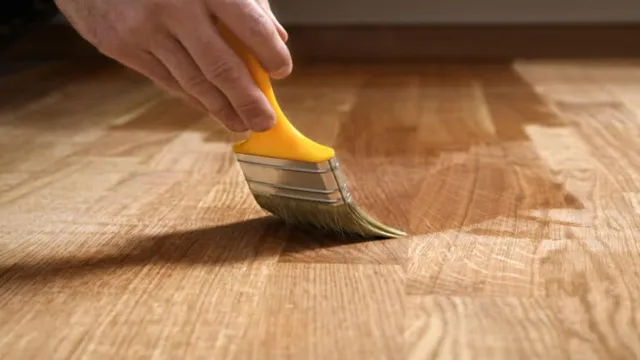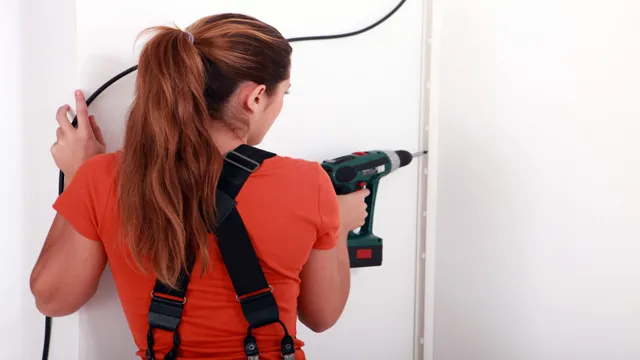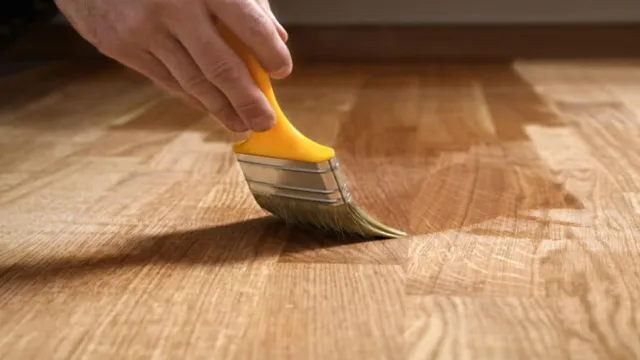What Size Pocket Screws for 3/4 Plywood: A Complete Guide to Choosing the Right Screws

Have you ever found yourself at a crossroads, struggling to choose the right pocket screw size for your plywood project? It can be an overwhelming decision, as selecting the wrong size can lead to weak joints or even splitting of the material. But fear not, because in this blog post, we’re going to guide you through the process of choosing the perfect pocket screw size for your plywood project. When it comes to selecting the right pocket screw size, there are a few factors to consider.
The thickness of your plywood, the type of wood you’re working with, and the hardware you’re using all play a role in determining the best screw size for your project. It’s important to note that not all pocket hole screws are created equal, and choosing the wrong one can lead to disastrous results. Think of choosing the right pocket screw size as a puzzle, with each piece fitting together perfectly to create a strong and sturdy joint.
You want to ensure that the screw is long enough to penetrate through both pieces of wood without poking out the other side, but not so long that it splits the wood. It’s all about finding the Goldilocks screw size – not too big, not too small, but just right. To make the decision process easier, manufacturers commonly offer a range of screw sizes that are specifically designed for different types of wood and plywood thicknesses.
By referencing this chart and ensuring that you have the right screw length, you can have peace of mind knowing that your joint is strong and secure. So, the next time you find yourself unsure about which pocket screw size to choose, remember to consider the thickness of your wood, the type of wood you’re working with, and the hardware you’re using. With these factors in mind, you’ll be able to confidently select the perfect screw size for your plywood project and create a sturdy joint that will stand the test of time.
Understanding Pocket Screws
If you’re wondering what size pocket screws to use for 3/4 plywood, the answer is simple: 1-1/4 inch pocket screws. These are the most commonly used screws for 3/4 inch thick material. Pocket screws are a convenient and strong way to join pieces of wood together.
They work by forming a pocket in one piece of wood and then using a specially designed screw to fasten it to another piece of wood. When using pocket screws, it’s important to use the correct size for your material thickness or you may end up with a weak joint. In addition to selecting the right size screw, it’s also important to use a drill bit that matches the size of the screw in order to create a precise pocket hole.
So next time you’re building with 3/4 inch plywood, be sure to have a pack of 1-1/4 inch pocket screws on hand for a strong and secure joint.
What Are Pocket Screws?
Pocket screws are a type of fastener designed to join two pieces of wood together at an angle. They are especially useful for creating strong and durable joints in furniture, cabinetry, and other woodworking projects. The screw is driven into a pre-drilled pocket hole, which is a specially designed pocket that allows the screw to hold the pieces of wood together securely.
Pocket screws are versatile and easy to use, making them a popular choice among DIY enthusiasts and professional woodworkers alike. They are also an excellent alternative to traditional joinery techniques like mortise and tenon joints or dowel joints. Overall, pocket screws are a reliable and efficient way to create strong and lasting joints in woodworking projects, and they are an essential tool in any woodworker’s toolkit.
So, next time you are working on a woodworking project, remember to consider using pocket screws for an efficient and secure solution.

How Do Pocket Screws Work?
Pocket screws are a popular choice for woodworking because they offer a simple and effective way to join two pieces of wood together. The screws work by using a specialized jig to drill a hole at an angle into one piece of wood, creating a pocket for the screw to be inserted. The second piece of wood is then placed against the first, and the pocket screw is driven through the pocket into the second piece, creating a strong, flush joint.
Pocket screws are particularly useful for joining pieces of plywood or other sheet goods, but can also be used for solid wood joinery. They offer a quick and easy way to create strong, hidden joints without the need for glue or clamps. When using pocket screws, it’s important to choose the right size screw for the job, and to use a high-quality jig to ensure accurate and consistent hole placement.
With the right tools and technique, pocket screws can be a valuable addition to any woodworking toolbox.
Factors to Consider for the Right Screw Size
When it comes to selecting the right screw size for a project involving 3/4 inch plywood, there are a few factors to consider. One of the first things to keep in mind is the type of pocket hole jig being used. Different jigs have different sized drill bits, and the size of the drill bit will determine the size of the screw.
In general, a 1-1/4 inch screw is a good choice for 3/4 inch plywood, but it’s always a good idea to consult the manufacturer’s recommendations or do a test run with scrap pieces of wood to ensure the right screw size is being used. Additionally, the type of wood being used, as well as the weight and stress the joints will be subjected to, will also play a role in determining the appropriate screw size. By taking all of these factors into consideration, the right screw size can be selected for a strong and durable joint.
Plywood Thickness
When it comes to working with plywood, the thickness of the material is a crucial factor to consider. It determines the strength of the finished project and affects the sizes of screws that can be used. Therefore, it’s essential to choose the right screw size for the thickness of the plywood to ensure the project’s longevity and stability.
The most common screw sizes used for plywood range from 1 ¼ inches to 3 inches with a gauge of 6 to 1 The larger the screw size, the more robust the material needs to be. For example, thicker plywood requires larger screws as they need to penetrate deeper into the material to hold it securely.
However, using screws that are too long or wide can cause splitting, which can affect the structural integrity. Therefore, it’s crucial to keep in mind the thickness of the plywood and the size of the screws to achieve the best results. By taking these factors into consideration, you can ensure that your plywood project is sturdy and long-lasting.
Screw Length
Screw Length When it comes to screw size, screw length is a critical factor to consider. Using the right screw size and length ensures that your fastenings remain stable and secure. Choosing a screw that is too short can lead to the screw not gripping properly, causing wobbling or even falling out.
On the other hand, using a screw that is too long can cause it to protrude from the material being fastened, which can compromise aesthetics and cause safety concerns. It’s important to understand the material you are drilling into and how deep the hole needs to be to ensure you choose the right length screw. Additionally, you should also consider the thickness of the material to be fastened as this will impact the length of the screw needed.
Taking these factors into consideration will help you select the right screw size and length for your project, ensuring a stable and secure fastening.
Screw Diameter and Thread Pitch
When it comes to choosing the right screw for your project, screw diameter and thread pitch are two critical factors to consider. The diameter of the screw is the measurement of the screw shaft’s thickness, while the thread pitch is the space between the threads on the screw shaft. Choosing the right diameter and thread pitch will ensure that the screw fits securely and functions properly.
A larger diameter screw with a coarser thread pitch is best for tougher materials, while a smaller diameter screw with a finer thread pitch is ideal for softer materials. Additionally, factors such as the weight of the load it will bear and the material being attached should also be considered when selecting the screw diameter and thread pitch. By taking these factors into account, you can choose the right screw size that will effectively and securely fasten your project.
Recommended Screw Size for 3/4 Inch Plywood
When it comes to using pocket screws for 3/4 inch plywood, it’s important to choose the right size for the job. The recommended screw size for 3/4 inch plywood is 1-1/4 inch coarse thread pocket screws. These screws are strong enough to hold the plywood securely in place and create a strong joint.
Using the wrong size screw can lead to weak joints and potentially dangerous situations. It’s also important to use the right drill bit size to create a pilot hole for the pocket screw. A 3/8 inch drill bit is recommended for the 1-1/4 inch coarse thread pocket screws.
Remember to always follow safety guidelines and use the appropriate size screw and drill bit for the job. With the right tools and techniques, you can create a sturdy and reliable joint for your 3/4 inch plywood project.
Screw Length
When it comes to selecting the right screw length for 3/4 inch plywood, it is important to consider the thickness of the material you intend to secure. For this application, the recommended screw size is typically a #8 – 1 1/4 inch screw. This size is a popular choice because it allows the screw to penetrate the wood enough to create a secure hold without the risk of splitting the plywood.
However, if you are working with thicker plywood or if the material you are securing requires a stronger hold, you may want to consider going up a size in both the screw diameter and length. It is always important to choose the appropriate screws for the job to ensure a safe and secure hold, so be sure to consult with a professional if you have any doubts or questions.
Screw Diameter and Thread Pitch
When it comes to choosing the right screw size for 3/4 inch plywood, you need to consider both the screw diameter and thread pitch. In general, a #8 screw with a fine thread pitch is suitable for plywood of this thickness. However, the type of screw you use will depend on the specific application and load capacity required.
For example, if you’re securing heavy-duty shelving to the plywood, you may want to choose a larger diameter screw with a coarse thread pitch to ensure maximum stability. On the other hand, if you’re attaching decorative trim, you may prefer a smaller diameter screw with a fine thread pitch that won’t detract from the appearance of the finished project. Before you begin your project, it’s important to research the load capacity of the screws you’re considering.
You don’t want to choose a screw that won’t be able to handle the weight of the item you’re securing, as this can result in damage or injury. Additionally, you should always use screws that are specifically designed for wood, as these will have a threaded shank that’s designed to grip and hold onto the plywood securely. Overall, the recommended screw size for 3/4 inch plywood is a #8 screw with a fine thread pitch.
However, it’s important to choose the right screw for your specific project and to consider the load capacity required. By taking the time to choose the right screw and ensuring that it’s properly secured, you can create a project that’s both attractive and functional, and that will stand the test of time.
Conclusion and Final Tips
And in conclusion, the debate over what size pocket screws to use for 3/4 plywood comes down to one question: are you a big screw or a little screw kind of person? But in all seriousness, it really depends on the thickness of your plywood and the type of joint you’re trying to achieve. So before you dive headfirst into your next woodworking project, take a moment to carefully consider the size of your screws and the strength of your joints. And if all else fails, just remember that sometimes the answer to a woodworking conundrum can be found in the most unexpected places – like a fortune cookie or a Magic 8 Ball.
Happy building!”
FAQs
What size pocket screws are best for 3/4 inch plywood?
The best size pocket screws for 3/4 inch plywood are 1 1/4 inch pocket screws.
Can I use self-tapping screws instead of pocket screws for plywood?
While you can use self-tapping screws for plywood, pocket screws provide a stronger and more secure joint.
What is the benefit of using pocket screws for plywood projects?
Pocket screws provide strong, hidden joints that are easy to assemble and disassemble. They also offer a clean, professional finish.
Can I use pocket hole joinery for thinner plywood, such as 1/2 inch or 1/4 inch?
Yes, pocket hole joinery can be used for thinner plywood, but it is important to use a smaller screw size to avoid splitting the wood.
How deep should I drill the pocket holes in plywood?
The pocket holes in plywood should be drilled to a depth of 1/2 inch.
What is the advantage of using a pocket hole jig for plywood projects?
A pocket hole jig ensures that the pocket holes are drilled at the correct angle and depth, resulting in a strong and secure joint.
Can I use pocket screws for plywood that will be used outdoors?
Yes, but you should use weather-resistant pocket screws specifically designed for outdoor use.







